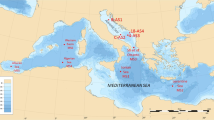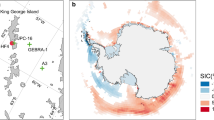Abstract
WE have investigated the levels of methyl mercury found in mercury-containing sediments from the River Mersey Estuary, England, as part of our work on the determination and transport of mercury in the environment1. We now wish to draw attention to the unexpected behaviour of sediment-bound methyl mercury on storage. In the initial stages of this study we experienced difficulty in obtaining consistent methyl mercury values; supposedly identical samples analysed at intervals of a few days gave markedly different results. We, therefore, followed the levels of methyl mercury in selected sediments over a period, to determine if any change was occurring on storage. We found that the amounts of methyl mercury observed in the stored sediments did not remain constant; initially there is a rise in the amount of methyl mercury observed, and then, after about ten days, the amount present begins to decline to levels which in general only approximate to those originally present. We have observed this phenomenon in nearly all of the Mersey sediments samples we have examined; in two cases where the total mercury levels were < 1.5 µg g−1, a rise in methyl mercury levels was not detected. In general the sediments were in fact found to contain quite high total mercury levels (usually between 5 and 8 µg g−1) and this feature may be a requirement for the effect to be observed.
This is a preview of subscription content, access via your institution
Access options
Subscribe to this journal
Receive 51 print issues and online access
$199.00 per year
only $3.90 per issue
Buy this article
- Purchase on Springer Link
- Instant access to full article PDF
Prices may be subject to local taxes which are calculated during checkout
Similar content being viewed by others
References
Craig, P. J. & Morton, S. F. Nature 261, 125–126 (1976).
Uthe, J. F., Solomon, J. & Grift, B. J. Assoc. Offic. Anal. Chem. 55, 583–589 (1972).
Jensen, S. & Jernelov, A. Nature 223, 753–754 (1969).
Spangler, W. J., Spigarelli, J. L., Rose, J. M. & Miller, H. M. Science 180, 192–193 (1973).
Olsen, B. H. & Cooper, R. C. Nature 252, 682–683 (1974).
Olsen, B. H. & Cooper, R. C. Water Research 10, 113–116 (1976).
Wood, J. M. Rev. Intern. Oceanogr. Med. Tomes XXXI–XXXII, 7–16 (1973).
McEntyre, F. E. & Neufeld, R. D. Water Pollut. Control 74, 465–470 (1975).
Billen, G., Joiris, C. & Wollast, R. Water Research 8, 219–225 (1974).
Imura, W., Pan, S-K, Shimizu, M. & Ukita, T. New Methods Environ. Chem. Toxicol. Collect Paper Res. Conf. New Methods Ecol. Chem. (ed. Coulston, F.) 211–216 (Int. Acad. Print Co. Ltd., Tokyo, Japan, 1973).
Wood, J. M., Kennedy, F. S. & Rosen, C. G. Nature 220, 173–174 (1968).
Author information
Authors and Affiliations
Rights and permissions
About this article
Cite this article
BARTLETT, P., CRAIG, P. & MORTON, S. Behaviour of mercury species in isolated estuarine sediment samples—growth and decay of methyl mercury during storage. Nature 267, 606–608 (1977). https://doi.org/10.1038/267606a0
Received:
Accepted:
Issue Date:
DOI: https://doi.org/10.1038/267606a0
This article is cited by
-
Effect of microbial life stages on the fate of methylmercury in natural waters
Bulletin of Environmental Contamination and Toxicology (1982)
-
The role of hydrogen sulphide in environmental transport of mercury
Nature (1978)
Comments
By submitting a comment you agree to abide by our Terms and Community Guidelines. If you find something abusive or that does not comply with our terms or guidelines please flag it as inappropriate.



